How is History remembered and told?
A documentary about an openly gay witness of Nazi Germany
| Gad Beck is probably one of the most colourful personalities in German Jewish history.
He survived Nazi-Germany as a homosexual and Jewish youth. A crucial experience in his life was the deportation of his Jewish lover Manfred Lewin who did not survive the Holocaust: the entire Lewin family was murdered in Auschwitz. As a “half-breed” by Nazi-standards Gad Beck was interned at Rosenstraße-camp in the centre of Berlin in 1943, but set free again after unique street-protests by non-Jewish relatives and friends. Soon after he joined the “Chug Chaluzi”, an underground Zionist youth group. As the leader of this illegal group, Gad Beck helped to organize the survival of many Jews in Berlin during the last two years of WW II. Notwithstanding his age Gad Beck speaks about his sexuality in a charmingly provocative way. Rather than having suffered from the persecution of homosexuals in Nazi-Germany Gad Beck believes his homosexuality has given him the strength and power to go into resistance and organize his own and other people’s survival. |
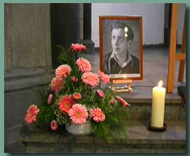 |
|
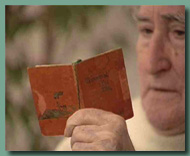
Gad Beck recites from a poetry booklet his lover gave him in 1942. |
||
| A brilliant and fascinating storyteller Gad Beck was much invited to talk shows on German television and to lectures and book presentations in the US, most notably at the US Holocaust Memorial Museum in Washington. His extraordinary perspective on German history doesn’t lend itself to ritualized professions of pitifulness.
However, the film doesn’t just retell the history of Gad Beck's life and of the Chug Chaluzi. In an increasingly thrilling and complex collage the film successively unfolds the processing of history by Gad Beck himself, by other contemporary witnesses, and by various media and representational institutions. How is history remembered, fashioned and told both by individual and by social agents? The memories of historical witnesses are contrasted with one another and with excerpts from fictional movies, talk shows, and a memorial service. It seems that in order to make his point Gad Beck occasionally blurs the distinction between historical fact and legend. Such poetics of memory, however, seems less inspired by his desire to stand in the limelight than by his wish to comply with the audience and media in their urge towards the spectacular story. It becomes increasingly clear that history is not only fictionalized in movies like “Rosenstraße” (directed by von Trotta, Germany 2003) or in the blockbuster productions of Steven Spielberg, but also in the memory of contemporary witnesses themselves. In such a situation the classic authentication and truth strategies of documentaries become obsolete. A stage production which claims to be strictly documentary proves this point. Confronted with the poetics of memory this production seeks to establish the historical truth of “That’s how it was”. |
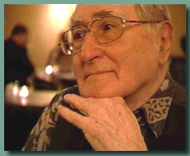 |
|
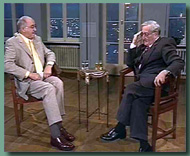
Gad Beck in primetime TV |
||
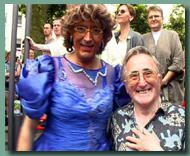
Gad Beck at Christopher-Street-Day |
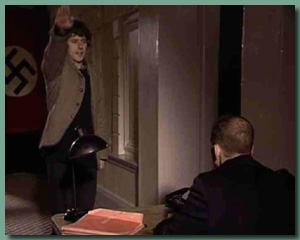 |
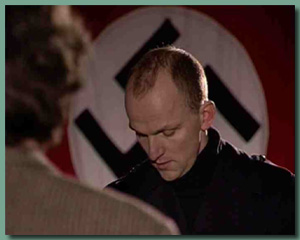 |
|
|
The liberation of Manfred is being staged and ... |
||
| In contrast, our film from its very beginning through the filmmakers’ presence reveals itself as a production. “I don' t remember how it was. Do you want to hear it again?” asks Gad Beck with disarming frankness at one point during the shooting. In an ironic allusion to the genre of fictionalized documentaries Gad Beck appears as director of film scenes, giving advice to young actors on how to stage some of the more incredible stories of his life.
While deconstructing Gad Beck’s story-telling and the public staging of historical memory the film at the same time tries to capture a more “private” Gad Beck – his sense of humour, his courage, his vanity, his openness and his injuries. The film is a vehement plea to acknowledge the complexities and contradictions of life. It wants to encourage viewers to think twice about the biography of Gad Beck and the interaction of presence and past in oral history. The material presented and the questions raised are open to discussion and interpretation. We think, that's what documentaries should aim for. |
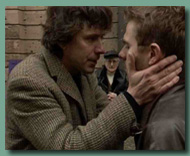
... Gad Beck gives advice as |
|
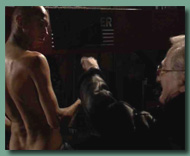
Gad Beck stages an erotic encounter during his time in forced labour. |